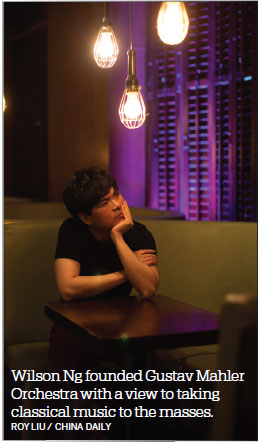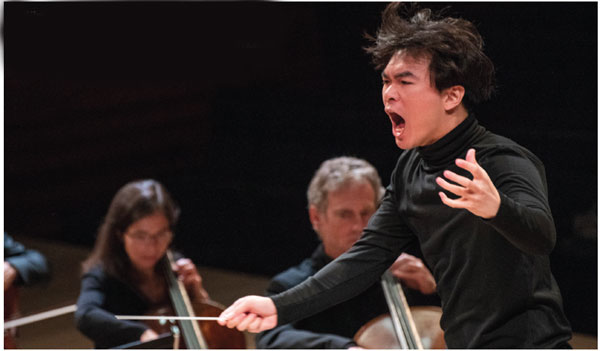Holding the baton in Seoul
Updated: 2019-04-05 06:50
(HK Edition)
|
|||||||||
HK's own music prodigy Wilson Ng recently became the first Chinese associate conductor at the prestigious Seoul Philharmonic Orchestra. Neil Li caught up with the young maestro.
Arising young musician from Hong Kong is all set to take one of Asia's top orchestras to new heights. In January, 29-year-old Wilson Ng became the first Chinese person to be appointed as associate conductor of the Seoul Philharmonic Orchestra (SPO).
"It feels very strange but (I'm) also very honored to be chosen as the associate conductor," says Ng. "I'm very excited because the SPO is very established and known as one of the best orchestras in all of Asia."
Ng received his first flute lesson at the age of 11. He went on to study the flute in France and Switzerland, performing in concerts and recitals around the world. At 15, he got his first taste of conducting when he was asked to step in for his mentor during an orchestral rehearsal. After that he gained conducting experience by working with leading orchestras in Europe.
"Conducting is a little bit like living in a luxury hotel," he explains. "Once you've stayed in one, it's hard to stay anywhere else. As a flutist, you're one important component of a painting, but as a conductor, I can see the entire painting. There's no other job in the world where there are 100 individuals in front of you that can't speak except only for you."
Ng describes his conducting style as "together we make something happen". He enjoys creating an atmosphere of teamwork where he suggests different ideas or methods rather than making specific demands of his musicians.
A conductor's vocation, he feels, is less about exercising control than bringing out the best in each orchestra member's performance. "Like with many leaders, conductors have the ability to make everyone stronger," says Ng, and, in turn, the orchestra comes up with "something amazing".
Leading the finest
When he was asked to travel to Seoul for the second round of auditions as one of four candidates, Ng wasn't very confident about getting the job. He knew he would have to compete with a number of talented Korean conductors. On reaching Seoul, he found that two of his competitors were Korean and all three were much older than him.
It had looked like the associate conductor's job would go to a more experienced person than Ng. "And if I did get selected, it would most likely be for the assistant conductor position," he had thought. So getting selected for the top job was as surprising as it was humbling, says Ng.

He is conscious of the fact that there will be people doubting his abilities on account of his young age. However, he believes youth has its own advantages and will allow him to bring other intangibles like passion and energy to the role. In his first year, he hopes to become indispensable to the orchestra as he looks forward to working with and learning from the world-class musicians of the SPO. He anticipates being under pressure to work in sync with the orchestra, but says he's ready for the challenge.
"The funny thing with conducting is that when an orchestra is not in its top quality, you always have to ask yourself 'what can they do?," says Ng. It doesn't make sense to be overly ambitious if the musicians lack the wherewithal to achieve it, he adds. However, when it's an orchestra such as the SPO - capable of executing the toughest of projects envisioned by the conductor, "then you have to start thinking 'what should you (the conductor) do?'. It's a new experience for me to try to learn where the limit is when you're working with such an outstanding orchestra."
Taking music to the masses
Besides working with professional musicians, Ng is keen to encourage appreciation of classical music and nurture young classical musicians. In 2014, he founded Gustav Mahler Orchestra (GMO) to provide more opportunities to younger Hong Kong musicians to perform. He also wanted to introduce classical music to audiences who don't normally go to concerts. GMO takes classical music to the public, for a change. The orchestra has performed in live venues, shopping malls and even a temple.
GMO also runs a program called "Musicians Without Borders" where they make the musicians sit among the audience rather than perform on a stage. This allows the audience to closely experience the variety of sounds and learn what it feels like to be part of an orchestra.
At the end of the day synchronicity forms the basis of an orchestra "so it's amazing for people to experience and appreciate teamwork in a form of art," Ng says. "It's like society (in miniature) - everyone has their own voice and thinking, but with one source of direction, they all go the same way, speak the same language and sound unified with harmony."
Ng sees a bright future for classical music in Hong Kong.
"(The scene) is quite healthy because there are a lot of young people who are curious about the music at performances," he says. "The audience overseas usually comprises older people."
Still, Hong Kong could do with some more classical music events, he feels. "Hong Kong is not a big place. Classical music can create an imaginative space for people to go to and enjoy."
|
Wilson Ng believes his energy and passion for music will stand him in good stead when he leads the world-class musicians of Seoul Philharmonic Orchestra. |
(HK Edition 04/05/2019 page7)
